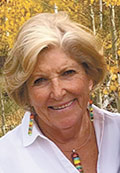June 1, 2024
The Season of Hope!
 By Mary Schricker Gemberling
By Mary Schricker Gemberling
“It is difficult to say what is possible,
for the dream of yesterday is the hope of today
and the reality of tomorrow.
… Robert H. Goddard
With spring comes a resurgence of hope. The arrival of buds on the trees and sprouts emerging from the ground bear the promise of bright blooms or delicious bounty. Commencement speeches give voice to the hopes and dreams of the future; the forever dreams of brides turn to hopes as they walk down the isle to their new life; and a new mother gazes into the eyes of her newborn overwhelmed by the
feeling of hope.
The factors that affect the inception and outcome of our hopes and dreams vary greatly with age and circumstances. A small child might hope that school will soon be out for the summer, whereas his high school sibling is hoping to get in the college of choice. Another young person might just be hoping to be the first in their extended family to graduate high school. A young married couple might be dreaming of a new house to fill with children while another, whose home was recently destroyed by war, is only hoping to find shelter for the night. As we age our hopes and dreams become more complex. The young executive might be excited about a promotion but must consider the consequences of his decision. The hopes of retirees can be complex with concerns about money, moving, and time management. As we further age our dreams mirror our needs and often become more simplistic.
 Hopes and dreams are not always synonymous with each other. While both words means ‘to await some occurrence or outcome,’ hope implies little certainly but suggests confidence or assurance that one’s desires will happen. Dreams have an expiration date, hope endures forever.
Hopes and dreams are not always synonymous with each other. While both words means ‘to await some occurrence or outcome,’ hope implies little certainly but suggests confidence or assurance that one’s desires will happen. Dreams have an expiration date, hope endures forever.
As we watch the news we are reminded daily of the devastation of war, senseless shootings, and the anger of Mother Nature turning the valuable possessions of people’s lives into rubble. How do the people affected by tragedies survive; where is their hope?
Bad things happen to people every single day. We know this, yet we are tasked with finding ways of moving forward in a world where nothing is guaranteed. Having hope can show us that circumstances can improve, that we can persist, that there is at least as much good in the world as bad. We presently live in a vulnerable time, when many are seeking out hope. We are tired of pandemics, natural disasters and violence. We crave stories about good deeds and happy endings.
Beginning in the 1980s, the psychologist C. Rick Snyder, PhD, set the stage for much of today’s research about hope. Snyder defined ‘hope’ as “the perceived capability to derive pathways to desired goals, and motivate oneself to use those pathways.” Snyder also published work on positive psychology, or the study of how people and communities can thrive. Unlike optimism, which is simply the expectation of a better future, hope is action-oriented and a skill that can be learned. Hope is a measurable, learnable and teachable skill that can have a positive impact on one’s life. It is an essential component of our well-being, but what can we do when it seems to be in short supply?
Keep a positive attitude with gratitude. Spending a few minutes each day recounting the positives in your life can have enormous impact. We all have a choice when we wake each morning; we can look around and see what is good in our lives, or we can begin complaining and ruin, not only our day, but the day(s) of those around us. We all know high-hope people who, no matter what life throws at them, endeavor to see the silver lining. They do not let the circumstance define their emotional response. If being positive does not come easy for you, try to envision realistic ways that your circumstances may improve. Remind yourself that pain, discomfort and even sorrow can pass with time.
Stick with Positive People. Being around positive people is one way to keep an optimistic mindset. This does not mean being intolerant of another person’s difficulties, negativity, or struggles, but it does mean that hopeful people tend to spend more time associating with those who share a bright and proactive attitude.
Stay in community. Hope can occur in isolation, but it grows when you are connected to supportive people. A community of hopeful people can inspire you by encouraging you in your goals. One benefit of being in a community when you’re trying to maintain hope is there are people who are living examples of what hope looks like when it’s achieved. If that community to which you belong also includes Faith in a higher being, you are one step ahead, for you always have someone to talk to, even when you are the only one in the room.
Focus on the Present. People high in hope tend to focus on what is in front of them. They do not dwell on the past or worry about the future. As they set goals for themselves they stay focused on what is happening right now. This allows them to stay positive and take action.
Set and Achieve Goals. Goal-setting is only as important as the action you take toward achieving your goals. Without a clear goal, it is easy to get distracted and lose focus. Rather than just let life happen, make decisions and take action to move forward in your life. Whether it is a big dream or a small goal, have something you are working toward. Visualize your goals and create conditions that set you up for success.
Be Self-Reflective and Confident. In addition to believing in yourself it is also important to be able to forgive yourself. Failure is inevitable for all of us at some time in our life, but we need to learn from those experiences, while moving
forward with positive momentum.
Be flexible. When a designated pathway does not lead directly to a goal, do not feel discouraged; modify your approach and goal. Reframing the outcome can help promote flexibility.
Celebrate your success. Your wins may not always be in the same context you’re hoping for, but it’s important to recognize that you are achieving some aspect of the goal.
As we reach our senior years our wins can be smaller and our setbacks more frequent. I have watched many
older people become less involved, less mindful, and more sedentary because the insurmountable events in their lives crushed their hope. Our lifestyle can have a huge effect on our attitudes as we age. Gary and I reside in two totally different environments during the year. When we are at our Florida condo we are surrounded by active people who encourage us to keep up with a very busy schedule going places, meeting new people, and trying new things. At the end of the day we have fewer aches and pains, and usually ,awake the following day filled with hope for what’s ahead. While back home in the midwest we sometimes struggle to find enough to do. With our yard work contracted out, we have to be purposeful in taking frequent walks and making arrangements to fill our social schedule. Don’t get me wrong, we love living in both locations, but it is easy to see how being unmotivated can lead to an inactive, unhealthy lifestyle.
Hope is a mindset; it is choosing positivity or negativity. It is calling a friend and meeting them for lunch. It is getting out in the sunshine and taking a walk. It is waking up each day and living that day as fully as you can with a clear idea of what you are going to do tomorrow and the next day whenever possible.
“Today is a gift; that is why we call it the Present.”
…………….Eleanor Roosevelt
Mary, a former educator and Seniors Real Estate Specialist. Mary is the author of four books: The West End Kid, Labor of Love, Hotel Blackhawk; A Century of Elegance, and Ebenezer United Methodist Church; 150 years of Resiliency.
Filed Under: Community, Family, Health & Wellness, Personal Growth
Trackback URL: https://www.50pluslife.com/2024/06/01/the-season-of-hope/trackback/




